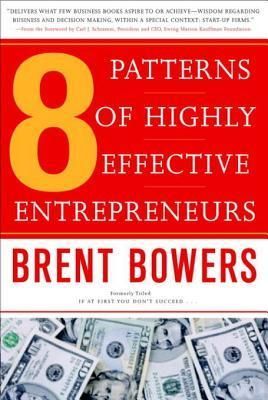
8 Patterns of Highly Effective Entrepreneurs
“As unique as it is valuable, [8 Patterns of Highly Effective Entrepreneurs] achieves where so many business books fail. It provides practical advice for individuals . . . [I]t delivers what few business books ever aspire to achieve—wisdom regarding business and decision making, within a special context: start-up firms.” —From the Foreword by Carl Schramm, president and CEO, Ewing Marion Kauffman Foundation At age seven, Cameron Johnson sold tomatoes door-to-door from his family’s farm. Pete Amico quit his job on his first day because he didn’t feel like taking orders from his boss.Greg Herro built a successful business selling diamonds made from the carbon extracted from ashes. If any of these people remind you of yourself, you just might have the kind of personality to take the small business world by storm. In 8 Patterns of Highly Effective Entrepreneurs, Brent Bowers reveals the eight patterns that highly successful entrepreneurs share—and what we can learn from them. In covering small business for decades at the Wall Street Journal and the New York Times, Bowers has chronicled the rise and fall of hundreds of start-ups. In this book, he draws on extensive interviews and research, as well as on the experiences and expertise of business consultants, venture capitalists, academia, and the entrepreneurs themselves, to describe the key characteristics shared by dozens of successful small-business owners and their companies. Among them: The ability to spot and seize opportunities An overwhelming urge to be in charge coupled with a gift for leadership The flexibility to come up with creative, out-of-the-box solutions to problems or obstacles Incredible energy and tenacity in the pursuit of their goals Unwavering faith in their business The ability to take smart risks The ability to bounce back from setbacks and see failure as just one step on the path to ultimate success This book offers invaluable lessons and insights for anyone thinking about starting a business or attempting a start-up a second or third time.